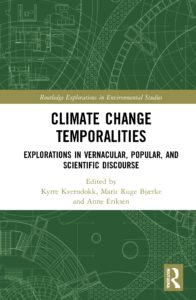After careful consideration of the world’s current circumstances and our hopes and sober expectations for the coming year, we have decided that the Climate Change Temporalities conference will be a digital event, on August 11-13, 2021.
In planning the digital format, program, and set-up of the conference we will draw on the extensive experience garnered in digital conferences and seminars over the last hectic year. We will make sure to have lots of time and dedicated rooms for discussion and informal talk, in addition to the keynotes and panel sessions. More casual peer conversation, networking and professional discussions hold an important role at conferences, and we are therefore making this a high priority. An extra bonus is of course that it saves the carbon footprint of travel.
We will present a dedicated webpage for the conference in the middle of May. On this webpage, which will be linked here, you will find more information about the conference program, with a presentation of the keynotes, abstracts and the digital platforms and set-up we will be using.

